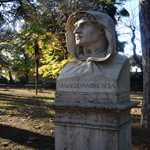 key
key /ˈkiː/
key
key /ˈkiː/
adjective
-
(
 )
Serving as an essential component
)
Serving as an essential component  (
primal
, cardinal
, key
, central
, fundamental
)
(
primal
, cardinal
, key
, central
, fundamental
)
serving as an essential component
 A cardinal rule
A cardinal rule
a cardinal rule
 The central cause of the problem
The central cause of the problem
the central cause of the problem
 An example that was fundamental to the argument
An example that was fundamental to the argument
an example that was fundamental to the argument
 Computers are fundamental to modern industrial structure
Computers are fundamental to modern industrial structure
computers are fundamental to modern industrial structure
noun
-
(
 )
Metal device shaped in such a way that when it is inserted into the appropriate lock the lock's mechanism can be rotated
)
Metal device shaped in such a way that when it is inserted into the appropriate lock the lock's mechanism can be rotated  (
key
)
(
key
)
metal device shaped in such a way that when it is inserted into the appropriate lock the lock's mechanism can be rotated
 I need a key to tighten this bolt
I need a key to tighten this bolt
I need a key to tighten this bolt
-
(
 )
Something crucial for explaining
)
Something crucial for explaining  (
key
)
(
key
)
something crucial for explaining
 The key to development is economic integration
The key to development is economic integration
the key to development is economic integration
-
(
 )
Pitch of the voice
)
Pitch of the voice  (
key
)
(
key
)
pitch of the voice
 He spoke in a low key
He spoke in a low key
he spoke in a low key
-
(
 )
Any of 24 major or minor diatonic scales that provide the tonal framework for a piece of music
)
Any of 24 major or minor diatonic scales that provide the tonal framework for a piece of music  (
tonality
, key
)
(
tonality
, key
)
any of 24 major or minor diatonic scales that provide the tonal framework for a piece of music
-
A lever (as in a keyboard) that actuates a mechanism when depressed
 (
key
)
(
key
)
a lever (as in a keyboard) that actuates a mechanism when depressed
 I need to replace the "Enter" key on my keyboard
I need to replace the "Enter" key on my keyboard
I need to replace the "Enter" key on my keyboard
-
The central building block at the top of an arch or vault
 (
headstone
, key
, keystone
)
(
headstone
, key
, keystone
)
the central building block at the top of an arch or vault
-
Mechanical device used to wind another device that is driven by a spring (as a clock)
 (
key
, winder
)
(
key
, winder
)
mechanical device used to wind another device that is driven by a spring (as a clock)
-
A generic term for any device whose possession entitles the holder to a means of access
 (
key
)
(
key
)
a generic term for any device whose possession entitles the holder to a means of access
 A safe-deposit box usually requires two keys to open it
A safe-deposit box usually requires two keys to open it
a safe-deposit box usually requires two keys to open it
-
A list of words or phrases that explain symbols or abbreviations
 (
key
)
(
key
)
a list of words or phrases that explain symbols or abbreviations
-
A list of answers to a test
 (
key
)
(
key
)
a list of answers to a test
 Some students had stolen the key to the final exam
Some students had stolen the key to the final exam
some students had stolen the key to the final exam
-
(basketball) a space (including the foul line) in front of the basket at each end of a basketball court; usually painted a different color from the rest of the court
 (
key
, paint
)
(
key
, paint
)
(basketball) a space (including the foul line) in front of the basket at each end of a basketball court; usually painted a different color from the rest of the court
 He hit a jump shot from the top of the key
He hit a jump shot from the top of the key
he hit a jump shot from the top of the key
 He dominates play in the paint
He dominates play in the paint
he dominates play in the paint
-
A coral reef off the southern coast of Florida
 (
cay
, Florida key
, key
)
(
cay
, Florida key
, key
)
a coral reef off the southern coast of Florida
-
A winged often one-seed indehiscent fruit as of the ash, elm or maple
 (
key
, key fruit
, samara
)
(
key
, key fruit
, samara
)
a winged often one-seed indehiscent fruit as of the ash, elm or maple
-
A kilogram of a narcotic drug
 (
key
)
(
key
)
a kilogram of a narcotic drug
 They were carrying two keys of heroin
They were carrying two keys of heroin
they were carrying two keys of heroin
verb
-
(
 )
Identify as in botany or biology, for example
)
Identify as in botany or biology, for example  (
discover
, distinguish
, key out
, describe
, identify
, key
, name
)
(
discover
, distinguish
, key out
, describe
, identify
, key
, name
)
identify as in botany or biology, for example
-
Harmonize with or adjust to
 (
key
)
(
key
)
harmonize with or adjust to
 Key one's actions to the voters' prevailing attitude
Key one's actions to the voters' prevailing attitude
key one's actions to the voters' prevailing attitude
-
(music) regulate the musical pitch of
 (
key
)
(
key
)
(music) regulate the musical pitch of
-
Vandalize a car by scratching the sides with a key
 (
key
)
(
key
)
vandalize a car by scratching the sides with a key
 His new Mercedes was keyed last night in the parking lot
His new Mercedes was keyed last night in the parking lot
His new Mercedes was keyed last night in the parking lot
-
Provide with a key
 (
key
)
(
key
)
provide with a key
 We were keyed after the locks were changed in the building
We were keyed after the locks were changed in the building
We were keyed after the locks were changed in the building
noun
-
United States lawyer and poet who wrote a poem after witnessing the British attack on Baltimore during the War of 1812; the poem was later set to music and entitled 'The Star-Spangled Banner' (1779-1843)
 (
Francis Scott Key
, Key
)
(
Francis Scott Key
, Key
)
United States lawyer and poet who wrote a poem after witnessing the British attack on Baltimore during the War of 1812; the poem was later set to music and entitled 'The Star-Spangled Banner' (1779-1843)







 key
key /ˈkiː/
key
key /ˈkiː/  )
Serving as an essential component
)
Serving as an essential component  (
primal
, cardinal
, key
, central
, fundamental
)
(
primal
, cardinal
, key
, central
, fundamental
) A cardinal rule
A cardinal rule
 The central cause of the problem
The central cause of the problem
 An example that was fundamental to the argument
An example that was fundamental to the argument
 Computers are fundamental to modern industrial structure
Computers are fundamental to modern industrial structure
 )
Metal device shaped in such a way that when it is inserted into the appropriate lock the lock's mechanism can be rotated
)
Metal device shaped in such a way that when it is inserted into the appropriate lock the lock's mechanism can be rotated  (
key
)
(
key
) I need a key to tighten this bolt
I need a key to tighten this bolt
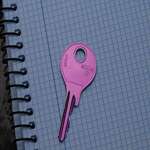
 )
Something crucial for explaining
)
Something crucial for explaining  (
key
)
(
key
) The key to development is economic integration
The key to development is economic integration
 )
Pitch of the voice
)
Pitch of the voice  (
key
)
(
key
) He spoke in a low key
He spoke in a low key
 )
Any of 24 major or minor diatonic scales that provide the tonal framework for a piece of music
)
Any of 24 major or minor diatonic scales that provide the tonal framework for a piece of music  (
tonality
, key
)
(
tonality
, key
) (
key
)
(
key
) I need to replace the "Enter" key on my keyboard
I need to replace the "Enter" key on my keyboard
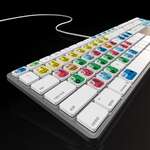
 (
headstone
, key
, keystone
)
(
headstone
, key
, keystone
)
 (
key
, winder
)
(
key
, winder
) (
key
)
(
key
) A safe-deposit box usually requires two keys to open it
A safe-deposit box usually requires two keys to open it
 (
key
)
(
key
) (
key
)
(
key
) Some students had stolen the key to the final exam
Some students had stolen the key to the final exam
 (
key
, paint
)
(
key
, paint
) He hit a jump shot from the top of the key
He hit a jump shot from the top of the key
 He dominates play in the paint
He dominates play in the paint
 (
cay
, Florida key
, key
)
(
cay
, Florida key
, key
) (
key
, key fruit
, samara
)
(
key
, key fruit
, samara
)
 (
key
)
(
key
) They were carrying two keys of heroin
They were carrying two keys of heroin
 )
Identify as in botany or biology, for example
)
Identify as in botany or biology, for example  (
discover
, distinguish
, key out
, describe
, identify
, key
, name
)
(
discover
, distinguish
, key out
, describe
, identify
, key
, name
) (
key
)
(
key
) Key one's actions to the voters' prevailing attitude
Key one's actions to the voters' prevailing attitude
 (
key
)
(
key
) (
key
)
(
key
) His new Mercedes was keyed last night in the parking lot
His new Mercedes was keyed last night in the parking lot
 (
key
)
(
key
) We were keyed after the locks were changed in the building
We were keyed after the locks were changed in the building
 Key
Key
 (
Francis Scott Key
, Key
)
(
Francis Scott Key
, Key
)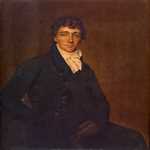

 Stratford-on-Avon
Stratford-on-Avon /ˈstrætfərd ɒn ˈeɪvɒn/
Stratford-on-Avon
Stratford-on-Avon /ˈstrætfərd ɒn ˈeɪvɒn/  (
Stratford-on-Avon
, Stratford-upon-Avon
)
(
Stratford-on-Avon
, Stratford-upon-Avon
)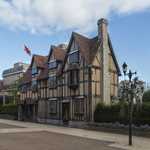

 Polyborus cheriway audubonii
Polyborus cheriway audubonii /ˌpɑːliːˈbɔːrəs tʃɛˈraɪweɪ ɔːˈduːbɔːniː/
Polyborus cheriway audubonii
Polyborus cheriway audubonii /ˌpɑːliːˈbɔːrəs tʃɛˈraɪweɪ ɔːˈduːbɔːniː/  (
Audubon's caracara
, Polyborus cheriway audubonii
)
(
Audubon's caracara
, Polyborus cheriway audubonii
)

 Arnold of Brescia
Arnold of Brescia /ˈɑrnəld ɒv ˈbrɛʃə/
Arnold of Brescia
Arnold of Brescia /ˈɑrnəld ɒv ˈbrɛʃə/  (
Arnold of Brescia
)
(
Arnold of Brescia
) Arnold of Brescia was a prominent theologian who challenged the church's wealth and power.
Arnold of Brescia was a prominent theologian who challenged the church's wealth and power.
